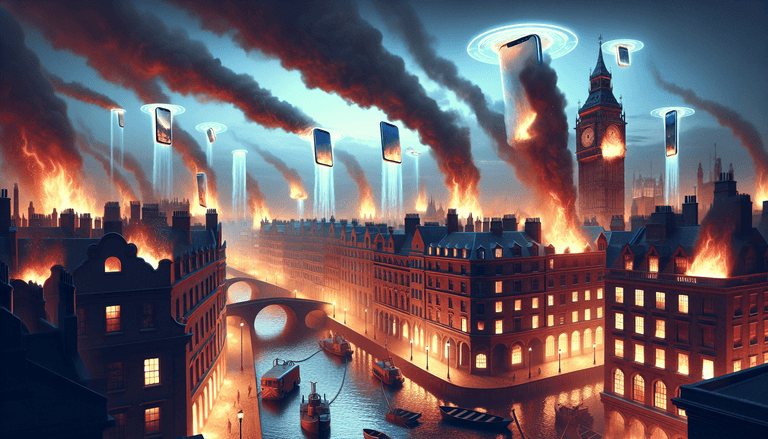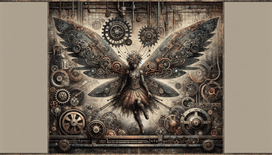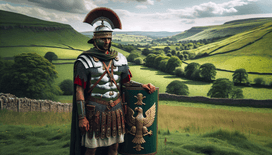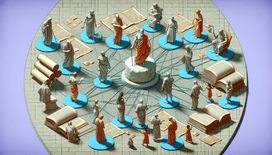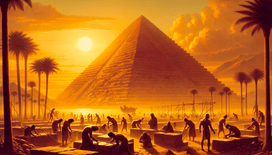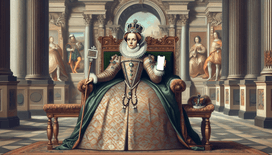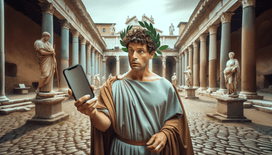Picture the scene: It's 1666, London is a bustling metropolis filled with timber-framed houses, narrow alleyways, and the signature aroma of ale mingled with smoky firewood. The only downside? The city's fire brigade is about as effective as a damp sponge in the Sahara. Enter stage left, the Great Fire of London.
We all know how it went down – literally. Wooden structures, a baking summer, and an insatiable inferno resulted in London becoming somewhat "toasty". But what if the denizens back in the day had access to smartphones and all the app-y wonders that come with them?
The Tinder That Sparked More Than Matches
Our story begins with Thomas Farriner, the baker behind what many might jovially consider the original "crown bake-off disaster". It's the early hours of morning, and Thomas is caught snoozing more than a Netflix auto-play. In a world where he could rely on a smartphone alarm, Thomas' blunder might have been relegated to history as "Ye Olde Snooze Gate".
Instead of embers growing in his bakery's bosom like a sixteenth-century loaf, Thomas could have whipped out his smartphone and, with a few swipes and taps, air-dropped the problem to London's brave souls.
Keeping the Fire Alarm-ed
Think of it: a community WhatsApp group called "Fire Watch 1666" where Captain John Smith (not to be confused with any Pocahontas pal) might sternly type, "🔥 🔥 FIRE! Pudding Lane is getting rather crispy! Everyone to the hoses! 🚨🚨". Our Victorian buddies could have rallied their buckets, prepared in urgent synchronous swipes, using those bloody helpful location pins!
Let us not forget about predictive text. Perhaps, in a fit of foresight and desperate accuracy, someone could have typed "Pudding Lane" and been automatically led to suggestively relevant GIFs of rain clouds.
Google Maps to the Rescue
If there's one thing we love about modern tech, it's the ability to chart a course with unsettling precision. Armed with smartphones, the people could have navigated London's chaotic cobblestone labyrinths with virtual blue lines guiding them savvily through the smoke-draped boroughs.
"Proceed to the fire," a prim robotic voice might have said, "and take the third left after St. Paul's... Sorry, Paul's on fire, try Fleet-street." Historical traffic jam averted, and London might have kept its sky unmarred by smoke signals.
Siri: Your New Seasonal Flame
Equipped with a penchant for sage (or shall we say, "sizzling") wisdom, Siri could have suggested alternative routes to emergency supplies, like Tim Cook's sassy aunt doling out survival advice. Imagine Siri's British voices giving Faroes' residents the heads-up they needed, all while tactfully reminding them to extinguish all candles aboard their wooden careering ships.
When the flames finally backed off, Siri could have gently nudged the damp lot to "Consider using Philips Hue lights for atmospheric ambience and to avoid, you know, catastrophic urban fires."
The Wrap-Up (Like a Sushi Roll, but Historical)
So, what could've been a fiery finale for Old London Town might have been doused quickly by those tiny gadgets we keep in our pockets today. Siri would have become the Fire Brigade's new mascot, and Londoners would have revelled in the joy of waking up to their darling timber dwellings instead of a feathery grey wasteland.
Alas, dear readers, history as we know it remains smartphone-free, but can you blame a curious mind like mine for wondering, "What if?"
As our blazing virtual adventure concludes, rest assured history buffs and tech enthusiasts, each time your smartphone pings, you're participating in a long line of "What if?" stories unknowingly sparking imagination for future generations. Until next time, stay curious, stay witty, and keep those imaginary fires burning bright… but not literally!
